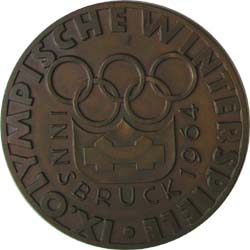|

|

|
|
|
|
|
|
Medal Information |
| |
Summer Olympics
1896 Athens, Greece
1900 Paris, France
1904 St.Louis, USA
1906 Athens, Greece
1908 London, England
1912 Stockholm, Sweeden
1920 Antwerp, Belgium
1924 Paris, France
1928 Amsterdam, Netherlands
1932 Los Angeles, USA
1936 Berlin, Germany
1948 London, England
1952 Helsinki, Finland
1956 Melbourne, Australia
1960 Rome, Italy
1964 Tokyo, Japan
1968 Mexico City, Mexico
1972 Munich, Germany
1976 Montreal, Canada
1980 Moscow, USSR
1984 Los Angeles, USA
1988 Seoul, Korea
1992 Barcelona, Spain
1996 Atlanta, USA
2000 Sydney, Australia
Winter Olympics
1924 Chamonix, France
1928 St.Moritz, Switzerland
1932 Lake Placid, USA
1936 Garmisch, Germany
1948 St.Moritz, Switzerland
1952 Oslo, Norway
1956 Cortina, Italy
1960 Squaw Valley, USA
1964 Innsbruck, Austria
1968 Grenoble, France
1972 Sapporo, Japan
1976 Innsbruck, Austria
1980 Lake Placid, USA
1984 Sarajevo, Yugoslavia
1988 Calgary, Canada
1992 Albertville, France
1994 Lillehammer, Norway
1998 Nagano, Japan
2002 Salt Lake City, USA
| |
|
|
|
|
1964 WINTER OLYMPIAD
ISBRUCK, AUSTRIA
|

Hold mouse over image to view reverse.
If the image does not load, simply hit refresh.
|
Composition: | Bronze |
Shape: | Round |
Diameter: | 61 mm |
Thickness: | 4 mm |
Weight: | 78 grams |
Edge: | Plain |
Mintage: | 5,000 |
Designer: | Welz |
|
|
| DESCRIPTION |
The Innsbruck Olympic emblem surrounded by the legend IX OLYMPISCHE WINTERSPIELE lies atop its obverse while a cityscape of Innsbruck and Austrian Alps adorns the reverse with the designer’s name WELZ lies at approximately three o’clock. The medals were presented in a red plastic wallet with white colored writing, coat of arms and emblem
|
THE GAMES |
The 1964 Winter Olympics in Innsbruck were threatened by a lack of snow. The Austrian army rushed to the rescue, carving out 20,000 ice bricks from a mountain top and transporting them to the bobsled and luge runs. They also carried 40,000 cubic meters of snow to the Alpine skiing courses. When rain caused further havoc ten days before the Opening Ceremony, the army packed down the slopes by hand and foot. Politically, the Games were notable because East and West Germany entered a combined team. Lydia Skoblikova won all four women’s speed skating events to become the first athlete to win four gold medals in one Winter Olympics. Klavdia Boyarskikh earned three gold medals in cross-country skiing and, on the men’s side, Eero Mäntyranta won two. Sisters Christine and Marielle Goitschel finished first and second in both the slalom and the giant slalom. Ski jumping gained a second event, and the sport of luge made its Olympic debut.
|
|
|
| |
